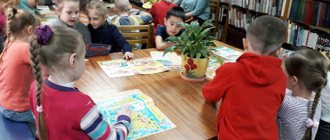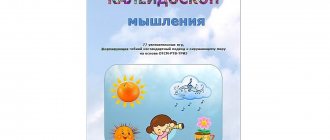Parents' Club "School of Caring Parents"
So what should we do?
So that the children are happy?! (parents' answers).
The bell rings.
Change.
Let's play the finger game " Friendship"
» for the development of fine motor skills.
The girls and boys in our group are friends.
You and I will become friends little fingers.
Hello! (they say hello with each finger). (The bell rings).
Recommendations for parents. • Set the child in a positive mood. Instill in him that it is very cool that he has grown to the garden and become so big. • Do not leave him in the preschool group for the whole day right away, take him home as early as possible. Start visiting the preschool educational institution according to the algorithm proposed by experts. • Create a calm, conflict-free climate for him in the family. Spare his weakened nervous system. • Do not increase, but decrease the load on the nervous system. Stop going to public places and visiting for a while. Significantly reduce your television viewing. • Inform the doctor and caregivers about the baby’s personal characteristics as early as possible. • Do not bundle up your child, but dress him as necessary in accordance with the temperature in the group. Consult with the teachers, they will tell you how best to dress your child. • Create a routine for him on Sundays at home the same as in a child care facility. • Do not react to the child’s antics and do not punish him for his childish whims. • If a change in the child’s usual behavior is detected, contact a pediatrician or psychologist as soon as possible. • In case of severe neurotic reactions, leave the baby at home for several days and follow all the specialist’s instructions. Educator:
Dear Parents! Concluding my recommendations, I would like to draw your attention to a few points. Full adaptation of a child to kindergarten is possible no earlier than after 2-3 months. And during this entire period, care must be taken to ensure that the child does not feel too keenly the gap between his previous and present life. For example, try to dress him in familiar clothes for the first time, and give him his favorite toy to kindergarten. If a child is very bored, a photograph of his mother in the clothes closet or under the pillow of his crib can ease his condition; some small thing from his mother, for example, her scarf or handkerchief, can do the same.
Show as much interest as possible in his activities in kindergarten, listen carefully to his stories, save the drawings and applications that he brings; curiosity and the desire for action arise and develop (like the ability to speak or walk) with the benevolent and patient participation of adults, thanks to their constant encouragement. At first, a child may be very tired in kindergarten: new impressions, new friends, new activities, a large number of people. If a child comes home exhausted and nervous, this does not mean that his adaptation is difficult. It just takes time for the baby to get used to the new regime. Maintain relationships with your teacher and other parents. Be interested in who your baby is friends with, welcome and encourage friendship. Take part in your child’s life, rejoice in his successes and creativity.
MAGAZINE Preschooler.RF
The work program of the Parents' Club for the adaptation of children and parents to preschool educational institutionsThe work program is drawn up in accordance with regulatory documents:
- Federal Law of December 29, 2012 No. 273-FZ “On Education in the Russian Federation” ;
- Federal State Educational Standard for preschool education, approved by order of the Ministry of Education and Science of Russia dated October 17, 2013 No. 1155.
The program also takes into account the recommendations of the letter of the Ministry of Education and Science of Russia dated December 11, 2006 No. 06-1844 “On approximate requirements for additional education programs for children .
When entering a preschool educational institution (DOU), all children experience adaptation stress. The adaptive capabilities of a child of early and early preschool age are limited, so a sudden transition of a child to a new social situation and a long stay in a stressful state can lead to emotional disturbances or a slowdown in the rate of psychophysical development.
It is necessary to help children overcome the stress of admission and successfully adapt to a preschool or institution.
Young children are emotional and impressionable. They tend to quickly become infected with strong, both positive and negative, emotions of adults and peers, and imitate their actions. These features formed the basis for constructing a cycle of lessons. To reduce the impact of stress factors, classes are conducted with the participation of parents. In the presence of parents, children are more willing to make contact with a teacher or psychologist, interact with peers, participate in joint outdoor games, and are more actively interested in their environment and toys. It is very important that the child gains his first experience in a preschool institution with the support of a loved one. Joint classes are a kind of “master class” for parents, as the psychologist shows them new means and ways of communicating with children.
The informal atmosphere of classes contributes to more active and open communication between the teacher and psychologist and parents. The teacher takes an active part in the classes. He adopts the methods and techniques used by the psychologist in various situations, notes the games that children like the most and uses them in his work.
Goal: to create a favorable psycho-emotional climate and comfort for young children in the family and preschool institutions.
Tasks:
Create conditions for:
- relieving emotional and muscle tension in young children
- reducing impulsivity, excessive physical activity, anxiety, aggression
- development of attention, perception, speech, imagination, skills of interaction with each other in children
- development of a sense of rhythm, general and fine motor skills, coordination of movements; gaming skills, voluntary behavior in children
- to form an adequate perception of parents of their child
Contribute:
- creating a favorable microclimate in the family to maximize the development of the child’s personal and social resources
- formation of partnerships between parents and institutions that provide interconnection and complementarity of knowledge, enrichment of experience
- personal and social development of parents, formation of skills of social activity and constructive behavior.
The program was developed using the methodology described by A.S. Ronzhina in the book “Psychologist’s classes with children 2-4 years old during the period of adaptation to a preschool institution .
Main activities:
- educational (educational) - the formation in parents of an adequate perception of the child, acceptance of his characteristics, pace and originality of psychophysical development. Thanks to educational activities, mutual understanding and interaction between specialists and parents are formed, and attitudes towards the child and themselves change. At club meetings, parents receive additional information about the characteristics of the child’s development, directions of his upbringing and education.
- psychoprophylactic - reducing the level of psycho-emotional stress, forming a positive image of the future child and the family as a whole, psychological and pedagogical support for the family. Thanks to psychoprophylactic methods, parents become calmer and have a desire to cooperate. At the same time, there is a significant stabilization of the psycho-emotional state in children.
- integration - social self-realization of parents, changing society's attitude towards them. Thanks to appropriate activities, objective involvement in public life and social significance is formed, which significantly affects the development of the child.
Club participants: educational psychologist, music director, teacher, speech therapist.
The basic means of work are a variety of games with speech accompaniment: round dances, marches, songs, nursery rhymes, rhymes, “okay” and “catch-up” . They quickly involve children in their rhythm, switch them to different types of activities, unite them, and set a positive emotional mood. In these games, even shy, introverted children gradually overcome their internal barrier and make contact with adults and peers.
1. 2 Planned results of mastering the program:
Children: successful adaptation to preschool education;
Parents: developing an adequate perception of their child; the formation of a favorable microclimate in the family to maximize the development of the child’s personal and social resources; formation of partnerships between parents and the institution, enrichment with experience.
| Next > |








